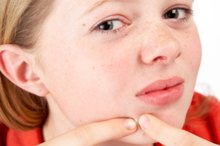What does fact checked mean?
At Healthfully, we strive to deliver objective content that is accurate and up-to-date. Our team periodically reviews articles in order to ensure content quality. The sources cited below consist of evidence from peer-reviewed journals, prominent medical organizations, academic associations, and government data.
The information contained on this site is for informational purposes only, and should not be used as a substitute for the advice of a professional health care provider. Please check with the appropriate physician regarding health questions and concerns. Although we strive to deliver accurate and up-to-date information, no guarantee to that effect is made.
Vitamin C for Cystic Acne
Cystic acne, the most severe type of acne, can leave you with painful, pus-filled cysts on your face and body. Leaving them alone go away naturally is not an option. Over--the--counter medications, prescription ointments and drugs as well as laser therapies are often used to treat cystic acne. Vitamin C may be an effective way to provide relief for cystic acne suffers.
Cystic Acne
Cystic acne is also known as acne vulgaris. Severe forms of acne are classified as nodules and cysts. Acne cysts are pus-filled and have a diameter of 5 millimeters or larger across, according to Acne.org 2.
While cystic acne can be unsightly and painful, lesions should be left alone. Picking on acne lesions can lead to scarring, painful inflammation and deeper infection. Dermatologists can often administer a cortisone injection to help reduce swelling, pain and scarring associated with cystic acne.
- Cystic acne is also known as acne vulgaris.
- Dermatologists can often administer a cortisone injection to help reduce swelling, pain and scarring associated with cystic acne.
Vitamin C and Cystic Acne
Home Remedy for an Infected Pimple
Learn More
Vitamin C -- or ascorbic acid -- is a powerful antioxidant that helps to promote the health of your immune system 3. Vitamin C helps to promote the healing, growth and repair of tissues throughout the body, according to "The Vitamin Book." Vitamin C is also necessary in the production of collagen, which helps to create new skin, form scar tissue as well as form blood vessels and tendons. The antioxidant properties of vitamin C help in skin regeneration. Vitamin C helps to protect skin from free radical damage as it heals.
- Vitamin C -- or ascorbic acid -- is a powerful antioxidant that helps to promote the health of your immune system 3.
- Vitamin C is also necessary in the production of collagen, which helps to create new skin, form scar tissue as well as form blood vessels and tendons.
Vitamin C sources
There are a number of ways to get vitamin C to help clear-up and prevent the formation of cystic acne. Vitamin C can be found in a number of foods you consume on a daily basis. You can also obtain vitamin C through a supplement.
Considerations
Why does Vitamin B12 Cause Acne?
Learn More
Consult a dermatologist prior to beginning a vitamin C regime for cystic acne. A dermatologist can help determine the best course of treatment and the appropriate dosage of vitamin C for your cystic acne. The National Institutes of Health indicates adolescent boys -- ages 14 to 18 -- should consume 75 milligrams per day and adolescent females should consume 65 milligrams per day 3. Men 19 and older should consume 90 milligrams per day and women should consume 75 milligrams per day.
- Consult a dermatologist prior to beginning a vitamin C regime for cystic acne.
- A dermatologist can help determine the best course of treatment and the appropriate dosage of vitamin C for your cystic acne.
Related Articles
References
- The Vitamin Book; Harold M. Silverman, et al.
- Acne.org: Types of Acne
- National Institutes of Health: Vitamin C
- Whitney KM, Ditre CM. Management strategies for acne vulgaris. Clin Cosmet Investig Dermatol. 2011;4:41-53. doi:10.2147/CCID.S10817
- National Institute of Arthritis and Musculoskeletal and Skin Diseases. Living with acne. Updated September 2016.
- Zaenglein AL, Pathy AL, Schlosser BJ, et al. Guidelines of care for the management of acne vulgaris. J Am Acad Dermatol. 2016;74(5):945-73.e33. doi:10.1016/j.jaad.2015.12.037
- Rathi SK. Acne vulgaris treatment : the current scenario. Indian J Dermatol. 2011;56(1):7-13. doi:10.4103/0019-5154.77543
Writer Bio
Michelle Zehr started writing professionally in 2009. She has written on health, fitness, fashion, interior design, home decorating,sports and finance for several websites. Zehr possesses a Bachelor of Arts in communication from the University of Pittsburgh, a Master of Arts in professional writing from Chatham University and a graduate certificate in health promotion from California University of Pennsylvania.








